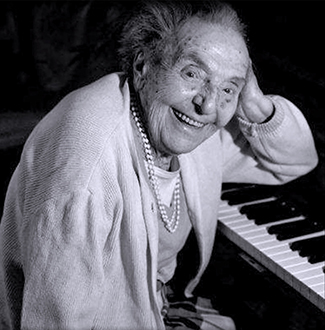
Alice Herz Sommer
Watch Alice Herz Sommer’s full testimony from the Visual History Archive as part of Comcast’s Days of Remembrance: PastFORWARD broadcast April 15-June 1, 2015.
Perhaps no musical Holocaust survivor is more well-known and beloved than Alice Herz Sommer.
Sommer was born Alice Herz in Prague in 1904 to a musical family and began learning piano at five years old. Her husband, Leopold Sommer, was a businessman and amateur violinist, and they had a son, Stepan. Once Germany invaded Czechoslovakia in 1939, Sommer and her family were forced into the Prague ghetto. In 1943, they were sent to Theresienstadt, a transit camp for hundreds of thousands of Jews who would eventually be sent to Auschwitz and other death camps.
Theresienstadt was different from other camps and ghettos, however, because members of the Red Cross came regularly to view the conditions of the camp. To hide the brutal conditions, Nazis staged various cultural activities put on by inmates to impress the Red Cross delegation. Sommer was therefore allowed to perform piano concerts, which ensured that she would never be transferred from Theresienstadt.
Though her husband was sent to Auschwitz and murdered there, Sommer and Stepan survived the war and immigrated to Israel in 1949, where she taught at the Rubin Academy of Music. Now known as Raphael, Stepan became a cellist and encouraged his mother to move to London in the 1980s, where she remained for the rest of her life. Raphael died in 2001 at age 64.
Throughout her life and even as her age advanced, Sommer continued to play the piano, practicing for several hours a day. She was the subject of the 2014 Academy Award-winning short documentary The Lady in Number 6: Music Saved My Life as well as a BBC documentary and several biographies.
Sommer was known for her optimistic spirit, sharp wit and complete dedication to her music, often talking about how music had kept her alive not only literally during the war but figuratively, when it was like a “spell” that allowed her to mentally escape her horrible circumstances in Theresienstadt. She credited her long life to her optimism and discipline, which kept her physically active and following a strict practicing routine well past her 100th birthday.
When she died in February 2014 at age 110, she was considered “the world’s oldest Holocaust survivor.”